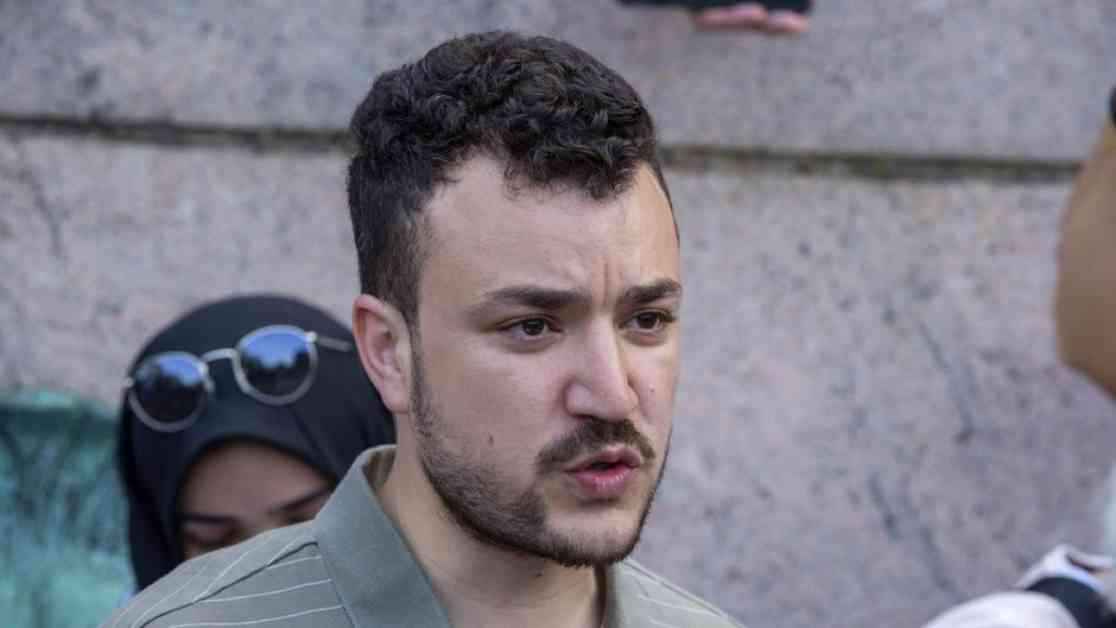Federal Judge Blocks Palestinian Activist’s Deportation Amidst Columbia University Protests
A recent federal court ruling in New York has halted the deportation of a high-profile Palestinian activist, Mahmoud Khalil, who was detained over the weekend for his role in leading demonstrations at Columbia University last spring. District Judge Jesse Furman has ordered a hearing for Wednesday, mandating all involved parties to attend while ensuring that Khalil remains in the country for the time being. This decision comes in response to the arrest of Khalil by Immigration and Customs Enforcement (ICE) agents on Saturday, following directives issued by President Donald Trump regarding antisemitism.
The arrest of Khalil, a recent graduate of Columbia University, has sparked controversy and legal action. Upon being taken into custody at his university-owned residence near Columbia, ICE agents initially cited a State Department order to revoke his student visa. However, upon learning that Khalil was a permanent resident with a green card, they threatened to nullify this documentation instead. Khalil’s attorney, Amy Greer, has been quick to challenge these actions, stating that her client has not been formally charged with any crime.
In a related incident, federal immigration authorities also targeted another international student at Columbia over the weekend, attempting to detain her without clear justification or a known identity. The Student Workers of Columbia, a graduate student union representing the woman, reported that ICE agents tried to enter her university-owned residence without a warrant but were rightfully turned away at the door. These events have raised concerns about the treatment of international students and the rights of protesters in the current political climate.
University Response and Political Backlash
Following these incidents, Columbia University has issued guidelines to students regarding federal authorities’ access to campus premises. The university’s policy emphasizes that ICE agents must possess a judicial warrant or subpoena to enter non-public areas, including student housing. Meanwhile, Secretary of State Marco Rubio has taken a firm stance on the issue, publicly asserting that the administration plans to revoke visas and green cards of Hamas supporters in the U.S. for deportation.
Khalil’s arrest marks a significant development in President Trump’s efforts to crack down on student activists protesting the conflict in Gaza. The administration alleges that individuals like Khalil, who support Hamas, have forfeited their right to reside in the United States. However, Khalil and his fellow student leaders deny these allegations, claiming they are part of a broader anti-war movement that includes diverse support from Jewish students and organizations.
Personal Impact and Legal Battles
Mahmoud Khalil’s detention has raised concerns about due process, free speech, and the treatment of activists on university campuses. As a prominent figure in last year’s protests, his arrest has captured national attention and led to calls for his deportation by pro-Israel groups. Additionally, he is among the students under investigation by a new Columbia office that has issued disciplinary charges against dozens of individuals for their pro-Palestinian activities.
Khalil, a recent graduate of Columbia with a master’s degree in international affairs, is facing an uncertain future in the wake of these developments. While detained in an immigration facility, his wife, who is eight months pregnant and an American citizen, awaits his return. The legal battle surrounding Khalil’s case mirrors broader debates about immigration policy, free speech, and political activism within academic institutions.
As the situation unfolds, a protest is scheduled to take place in front of ICE’s offices in Manhattan, drawing attention to Khalil’s plight and the broader implications of his arrest. The intersection of political, legal, and personal elements in this case underscores the complex challenges facing activists, immigrants, and students in today’s socio-political landscape.


